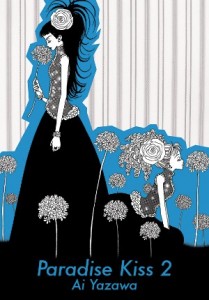By Ai Yazawa. Released in Japan by Shodensha, serialized in the magazine Zipper. Released in North America by Vertical, Inc.
The second volume of Paradise Kiss continues Yukari’s journey into the glamorous world of modeling, even though it’s also about finding that you can’t simply drop everything and start a new career with nothing to fall back on. It’s also about her growing feelings for George, and realizing that a relationship with him is likely going to be far more difficult than becoming a top model. And of course it’s also a josei manga by Ai Yazawa, even within its pages. George is put out that the plot changed in between chapters, he’s chided for reading the manga and seeing Yukari’s inner monologues, and Yukari even gets in on the act, noting that she’s the heroine and can control who the hero is by who she falls for. It does seem a bit odd having her break the fourth wall along with the others. Yukari is the one that’s supposed to be the grounded girl among these flighty artists.
But Yukari’s image of herself is changing. Miwako helps her land a modeling gig that her sister is designing for (more Neighborhood Story cameos, as fans once again whine that this never got licensed), and she pulls it off quite well. She then uses that contact to get in touch with an agency that wants to promote her. Yukari’s upbringing has basically stomped her self-image into the ground, so there’s a constant feeling from her of waiting for the other shoe to drop. But no, she is really good at this. The words of praise and encouragement from everyone but George help as well, and set up the emotional climax of this volume, where she reconciles with her mother and agrees to return to school (but still model). It’s great stuff.
The problem, of course, is that she’s also fallen for George, hard. And while he clearly has a desire to see her succeed, mature, and become strong, he also does not given her any sort of support or encouragement – at least not explicitly. Yukari has a tendency to overthink everything, so pairing her with a man who’s almost impossible to read is frustrating enough. But you get the feeling that, unlike the rest of the cast, if Yukari were to fail or not measure up to George’s ideals, he would simply move on. He doesn’t emotionally connect, unlike the rest of the cast. We do get more scenes here of Arashi and Miwako’s relationship troubles, and the fact that he’s still jealous and fearful of Hiro. They are both easy to relate to. George is not.
(Poor Arashi is also the only straight man in a cast filled with outlandish characters, and you can see that it exhausts him. This is why he needs to make up with Hiro – he’d finally have someone to take the pressure off.)
George is an incredibly popular character. He’s handsome, dashing, trying to be a good lover (physically, at least – and he’s not the best at that either, as is lampshaded in a conversation between him and Isabella). But he has no interest in the give of a give-and-take relationship, and thus is the sort of guy you like to read about but would hate to deal with in real life. The one time in the volume that he really seems to open up to Yukari is when he’s talking about the clothing that he’s designed. Which is great for a manga that runs in a fashion magazine, but, like Yukari, I keep waiting for the other shoe to drop. In the meantime, though, no one can deny that this is a glorious soap opera, well-told.

